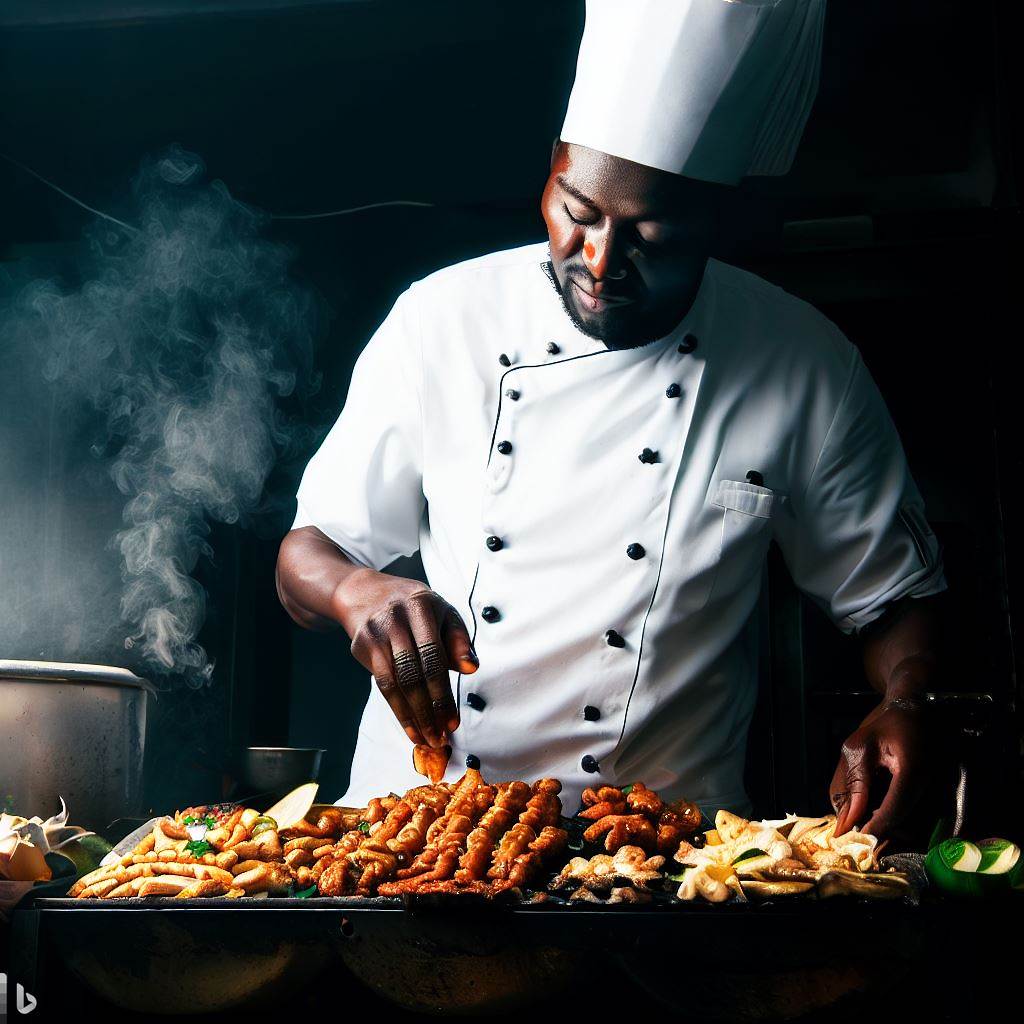Introduction
Nigerian street food culture is a vibrant and essential part of the country’s culinary heritage. This article discusses about Chef Guide to Nigerian Street Food Culture
It encompasses a diverse range of flavors, techniques, and traditions.
Brief explanation of Nigerian street food culture and its significance
is essential to celebrate and preserve the significance of Nigerian street food culture to ensure its continued influence and importance in the culinary world.
By embracing and learning from this culture, chefs and food enthusiasts can broaden their horizons and enrich their own culinary journeys.
Together, they can contribute to the preservation and evolution of Nigerian street food culture for future generations to enjoy.
Importance of understanding the culture for chefs and food enthusiasts
Understanding this culture is crucial for chefs and food enthusiasts as it allows them to appreciate the depth of Nigerian cuisine and incorporate it into their culinary creations.
By delving into the world of Nigerian street food, one can not only experience the rich and diverse flavors but also gain insight into the country’s history, people, and way of life.
Exploring this culture will provide chefs with inspiration, enabling them to create unique and innovative dishes that honor the traditions and flavors of Nigerian street food.
Additionally, understanding this culture promotes cultural exchange and appreciation, fostering a sense of unity and respect among chefs and food enthusiasts from different backgrounds.
Traditional Nigerian Street Foods
When it comes to Nigerian street food, there is an amazing array of traditional dishes that you must try.
These flavorful treats are not only delicious, but they also reflect the rich and diverse culinary heritage of the Nigerian culture in the Chef Guide to Nigerian Street Food Culture
Overview of some popular traditional Nigerian street foods
Suya
- Suya is a popular Nigerian street food made with grilled skewered meat, typically beef or chicken.
- The meat is marinated in a blend of spices, including ginger, garlic, and chili powder, before being grilled to perfection.
- Suya is often served with sliced onions, tomatoes, and a spicy peanut sauce that adds an extra kick of flavor.
- It is a mouthwatering delicacy that offers a perfect combination of smoky, spicy, and savory flavors.
Akara
- Akara, also known as bean cakes or bean fritters, is a common Nigerian street food made from black-eyed peas.
- The peas are ground into a batter and mixed with onions, peppers, and spices before being deep-fried into golden and crispy fritters.
- Akara is usually served with ogi (a fermented cornmeal porridge) or bread, making it a popular breakfast option.
- These protein-packed fritters are both delicious and filling, making them a favorite among Nigerians.
Moi Moi
- Moi Moi is a steamed bean pudding made from black-eyed peas or brown beans mixed with peppers, onions, and spices.
- The mixture is wrapped in banana leaves or aluminum foil and steamed until it becomes solid and custard-like in texture.
- Moi Moi is a versatile dish that can be enjoyed as a main course or as a side dish with other Nigerian delicacies.
- It is often served with rice, bread, or alone, offering a delicious and nutritious meal option.
Puff Puff
- Puff Puff is a popular Nigerian street snack that resembles deep-fried doughnut holes.
- The dough is made from flour, yeast, sugar, and spices, and it is deep-fried until it becomes golden and fluffy.
- Puff Puff can be enjoyed plain or sprinkled with powdered sugar for an extra touch of sweetness.
- It is a delightful treat that is often sold by street vendors, and it is loved by both kids and adults alike.
Common ingredients and preparation methods
As for the common ingredients and preparation methods, each dish has its own unique combination and technique.
However, some common ingredients found in these traditional Nigerian street foods include spices like ginger, garlic, chili powder, and onion.
Meats like beef and chicken are popular choices for suya, while beans are a staple ingredient in akara and moi moi.
Flour, yeast, and sugar are the main components of puff puff. Preparation usually involves marinating, grinding, mixing, and deep-frying or steaming.
These methods ensure that the flavors are enhanced and the dishes are cooked to perfection in Chef Guide to Nigerian Street Food Culture
Nigerian street food is a treasure trove of traditional dishes that delight the taste buds and showcase the culinary heritage of Nigeria.
From suya to akara, moi moi to puff puff, these foods offer a variety of flavors, textures, and aromas that will leave you craving for more.
So, the next time you visit Nigeria, be sure to explore the vibrant street food culture and indulge in the mouthwatering delights it has to offer!
Regional Variations
In Nigeria, street food culture varies across different regions, each offering a unique culinary experience.
Regional differences in Nigerian street food culture
Nigeria’s street food scene is a vibrant tapestry, reflecting the nation’s rich regional diversity.
In the bustling streets of Lagos, you’ll find suya, skewered spicy meat, sizzling on open grills.
In the South, savory puff-puff and akara, fried dough balls, delight taste buds.
Moving north to Kano, the aroma of mutton pepper soup wafts through the air, while in the East, the unmistakable scent of jollof rice draws crowds.
Each region boasts its own culinary treasures, showcasing unique flavors, spices, and techniques.
In the West, tantalizing amala and ewedu stew make a hearty meal, contrasted by the fiery moi moi of the South-South.
Nigerian street food isn’t just about sustenance; it’s a celebration of culture and community using the Chef Guide to Nigerian Street Food Culture
Whether you’re savoring the fiery spices of the North or the rich, complex flavors of the South, Nigerian street food offers a delicious journey through a nation’s heart and soul.
unique dishes from different parts of Nigeria
Northern Nigeria
- Suya: A popular street food in the northern region, it consists of skewered and grilled meat seasoned with spices.
- Tuwon Shinkafa: A staple northern dish made from pounded rice, often served with rich soups or stews.
The flavors in northern Nigerian street food are influenced by the abundant use of spices like ginger, garlic, and cumin.
Southern Nigeria
- Akara: These deep-fried bean cakes are a favorite street food across the southern region and are often paired with bread.
- Garden Egg Sauce: A popular accompaniment to street food, made from garden egg (a type of eggplant) and various spices.
Southern Nigerian street food culture showcases a wide range of flavors, with an emphasis on seafood and aromatic herbs.
Eastern Nigeria
- Nkwobi: A traditional eastern delicacy, it consists of spiced cow feet cooked until tender and served with palm wine.
- Abacha: A popular street food made from dried shredded cassava, spiced with utazi leaves, and served with various toppings.
Eastern Nigerian street food is heavily influenced by palm oil, utazi leaves, and other indigenous ingredients.
Western Nigeria
- Ewa Agoyin: A classic street food dish made from mashed beans cooked in a spicy sauce, often served with fried plantains.
- Amala: A popular street food staple, it is made from yam flour and served with various soups and stews.
The flavors of western Nigerian street food are characterized by the use of rich spices like locust beans, red pepper, and crayfish.
How regional ingredients and techniques influence the flavors
It’s fascinating to see how the regional ingredients and cooking techniques influence the flavors of Nigerian street food.
Whether it’s the aromatic spices of the north, the seafood flavors of the south, the palm oil-based dishes of the east, or the rich spices of the west, each region has its own distinct culinary identity.
Exploring the regional variations in Nigerian street food culture allows you to embark on a flavorful journey that truly captures the essence of the country’s diverse gastronomic heritage.
Street Food Vendors
In Nigerian culture, street food vendors play a crucial role and hold great importance.
Role and Importance of Street Food Vendors in Nigerian Culture
- Street food vendors are the backbone of Nigeria’s vibrant food culture.
- They provide affordable and convenient options for people looking for quick meals.
- Vendors are often considered the custodians of local culinary traditions.
- They offer an opportunity to experience the authentic flavors of Nigerian cuisine.
- Street food vendors contribute to the local economy by creating employment opportunities.
- They showcase the diversity of Nigerian food and promote cultural exchange.
- Vendors are crucial in preserving and passing down traditional recipes and cooking techniques.
Description of the Typical Street Food Vendor Setup
A typical street food vendor setup in Nigeria is a bustling and colorful sight to witness.
- Vendors can be found on street corners, markets, and popular gathering places.
- They set up makeshift stalls or carts adorned with vibrant decorations.
- The setup often includes cooking utensils, grills, pans, and ingredients neatly arranged.
- Many vendors have open-air kitchens, allowing customers to witness the food preparation process.
- The aroma of sizzling spices and mouth-watering dishes fills the air, enticing passersby.
- Small seating areas or plastic tables and chairs are available for customers to enjoy their meals.
Insights into the Day-to-Day Operations and Challenges Faced by Vendors
Operating as a street food vendor in Nigeria comes with its own set of challenges.
- Preparing food in large quantities demands meticulous planning and organization.
- Vendors wake up early to source fresh ingredients and start the cooking process.
- They work tirelessly throughout the day to cater to a constant stream of customers.
- Dealing with fluctuating food prices and maintaining affordability is a constant struggle.
- Hygiene and food safety are paramount, and vendors must adhere to strict standards.
- Weather conditions, such as rain or extreme heat, can affect operations and sales.
- Competition among vendors is fierce, and they constantly strive to attract customers.
- Vendors face challenges from authorities regarding permits and regulations.
- Balancing the demands of the business while managing personal and family life can be difficult.
Despite these challenges, street food vendors in Nigeria are resilient and tenacious.
They continue to provide a unique and cherished experience for locals and visitors alike.
Through their dedication and passion, they contribute to the rich tapestry of Nigerian street food culture.
Read: Curator Salaries in Nigeria: An In-Depth Analysis
Street Food Festivals and Events
Street food festivals and events in Nigeria are vibrant and celebratory affairs that showcase the rich culinary heritage of the country.
These events play a significant role in preserving and promoting the unique street food culture of Nigeria.
Introduction to street food festivals and events in Nigeria
Street food festivals and events are organized gatherings that bring together food enthusiasts, vendors, and chefs to celebrate the diverse street food culture of Nigeria.
These events serve as platforms for showcasing traditional dishes and innovative creations.
Highlighting some popular festivals and events that revolve around street food
- Lagos Street Food Festival: This annual festival held in Lagos is a melting pot of flavors, featuring an array of street food delicacies from different regions of Nigeria.
It attracts a large crowd of locals and tourists alike. - Abuja Food Expo: The Abuja Food Expo is a premier event where street food vendors and culinary experts come together to present their unique offerings.
The event showcases the city’s vibrant street food scene. - Calabar Carnival: The Calabar Carnival, one of Nigeria’s biggest street carnivals, is also a food lover’s paradise.
The festival offers a wide range of street food options, from spicy grilled meats to traditional snacks like akara and puff puff. - Ojude Oba Festival: The Ojude Oba Festival celebrated in Ogun State is not only a cultural extravaganza but also a foodie’s delight.
The festival features a grand display of street food stalls, offering a delightful culinary experience.
Explanation of how these festivals contribute to the preservation of street food culture
- Promoting traditional street food: Traditional street food vendors use street food festivals and events to showcase their culinary skills and pass down age-old recipes to the next generation.”
This helps in preserving and promoting the authentic street food culture of Nigeria. - Encouraging innovation and creativity: These events also encourage chefs and vendors to experiment with traditional recipes and create innovative street food dishes.
This fusion of traditional flavors with modern techniques helps in keeping the street food culture alive and evolving. - Boosting local economy: Street food festivals and events attract a large number of visitors, both domestic and international.
This increased tourism fosters economic growth in local communities and provides opportunities for street food businesses to thrive. - Cultural exchange and appreciation: These festivals serve as platforms for cultural exchange, where different regions and communities come together to share their street food traditions.
Visitors get to experience the rich diversity of Nigerian street food and develop a deeper appreciation for the culinary heritage of the country.
Street food festivals and events in Nigeria play a vital role in preserving and promoting the vibrant street food culture of the country.
These gatherings not only showcase traditional dishes but also encourage innovation, boost the local economy, and foster cultural exchange.
By attending these events, one can truly immerse themselves in the flavors and aromas of Nigerian street food.
Read: Educational Paths for Aspiring Curators in Nigeria

The Art of Eating Street Food
When it comes to enjoying Nigerian street food, there are certain etiquette and tips that can enhance your experience:
- Be open-minded and willing to try new flavors and textures.
- Engage with the local vendors and ask them about their specialties.
- Eat with your hands – it’s the traditional way and adds to the authenticity.
- Don’t be afraid to experiment with different combinations of sauces and condiments.
- Share your food with others and try a variety of dishes to get a well-rounded experience.
- Be mindful of the surroundings and dispose of any waste responsibly.
Hygiene concerns may arise when eating street food, there are ways to navigate them
- Look for vendors who have a clean and organized setup.
- Observe how the food is prepared and stored – make sure it is fresh and properly cooked.
- Go for hot and steamy dishes as they are less likely to harbor harmful bacteria.
- Avoid raw or unpeeled fruits and vegetables, unless you can wash them yourself.
- Drink bottled water or opt for freshly squeezed juices from trusted vendors.
Trying Nigerian street food provides several benefits for a complete immersion in the country’s cuisine
- Authenticity: Street food reflects the true flavors and techniques of Nigerian cooking.
- Variety: You can find a wide range of dishes, from savory snacks to hearty meals.
- Affordability: Street food is often more budget-friendly compared to restaurants.
- Community: Eating at street stalls promotes a sense of togetherness and local bonding.
- Discover new favorites: You might stumble upon hidden gems and unique culinary creations.
- Cultural experience: Street food allows you to taste what the locals eat on a daily basis.
- Exploration: It’s a chance to step outside your comfort zone and embrace new flavors.
- Memorable moments: Enjoying street food can create lasting memories of your trip to Nigeria.
Diving into the world of Nigerian street food is an adventure for the senses.
By following the tips, being mindful of hygiene, and embracing the benefits, you can savor the vibrant flavors and rich culinary traditions that define Nigerian cuisine.
Read: The Impact of Curators on Nigeria’s Cultural Heritage
Adaptation and Fusion
In the ever-evolving world of culinary delights, Nigerian street food culture has seamlessly embraced modern trends, resulting in a fusion that tantalizes the taste buds and captivates the senses.
Fusion of Street Food Culture with Modern Trends
Nigerian street food has not remained stagnant, but rather embraced the opportunities presented by modern trends.
One notable fusion is the incorporation of social media into the street food scene.
Street food vendors are now utilizing platforms such as Instagram and Facebook to showcase their culinary creations, attracting a wider audience and increasing their customer base.
Technological advancements have enabled Nigerian street food vendors to adopt innovative cooking methods.
From food trucks equipped with state-of-the-art kitchen appliances to mobile payment options like contactless cards and digital wallets, street food culture now seamlessly blends tradition with modernity.
Furthermore, the fusion of Nigerian street food culture with modern trends can be seen in the increased emphasis on health-conscious offerings.
Many vendors have recognized the demand for healthier alternatives and have started incorporating fresh ingredients, organic produce, and vegetarian options into their menus.
This adaptation allows street food enthusiasts to satisfy their cravings while still prioritizing their well-being.
Influences on Contemporary Culinary Scenes
Nigerian street food culture has not only impacted the local food scene but has also made a significant impression on contemporary culinary scenes worldwide.
Chefs and food enthusiasts from various cultures have been inspired by the bold flavors, vibrant colors, and unique combinations found in Nigerian street food.
One such influence can be seen in the rise of Nigerian-inspired pop-up restaurants and food festivals in major cities around the world.
These events showcase the diverse and rich culinary heritage of Nigeria, showcasing dishes such as jollof rice, suya, and puff puff, which have become mainstream favorites.
Moreover, Nigerian street food has influenced contemporary chefs in their approach to flavor combinations and ingredient pairings.
The use of traditional Nigerian spices, such as uziza, iru, and Cameroon pepper, has found its way into modern recipes across various cuisines, adding a delightful kick to familiar dishes.
Introduction of International Adaptations
As Nigerian street food gains global recognition, it has also welcomed international adaptations.
Chefs and food entrepreneurs from around the world have embraced Nigerian street food culture, putting their own spin on traditional dishes.
For example, in London, Nigerian street food has inspired the creation of gourmet jollof rice bowls, where the classic dish is elevated with premium ingredients and elegant plating.
In New York City, Nigerian suya has undergone a transformation, with upscale restaurants serving suya-spiced grilled meats alongside elegant side dishes and artisanal sauces.
These international adaptations not only showcase the versatility of Nigerian street food but also provide an avenue for cultural exchange and appreciation.
They allow people from different backgrounds to experience the flavors and aromas of Nigerian cuisine in unique and innovative ways.
The fusion of Nigerian street food culture with modern trends has revolutionized the culinary landscape.
This integration has resulted in an exciting blend of tradition, innovation, and international adaptations that continues to captivate food enthusiasts worldwide.
Whether it’s through social media, health-conscious offerings, or international adaptations, Nigerian street food has undoubtedly left its mark on contemporary culinary scenes.
Read: Challenges Faced by Curators in Nigeria’s Museums
Challenges and Future Prospects
As Nigerian street food culture continues to thrive, it faces several challenges in the modern age that need to be addressed to ensure its sustainability.
- Hygiene concerns: Maintaining proper hygiene standards can be a challenge for street food vendors.
- Food safety: Ensuring the safety of ingredients and preparation methods is crucial for consumer confidence.
- Regulatory compliance: Navigating the complex regulations and obtaining necessary licenses may pose difficulties.
- Competition from fast food chains: The rise of fast food chains creates a competitive landscape for street food vendors.
- Changing consumer preferences: As tastes evolve and dietary preferences shift, street food vendors must adapt to satisfy these demands.
- Inadequate infrastructure: Limited access to clean water, electricity, and waste management facilities can hinder operations.
Addressing challenges faced by Nigerian street food culture in the modern age
- Enhancing hygiene practices: Educating vendors about best practices and providing resources for proper sanitation following Chef Guide to Nigerian Street Food Culture
- Improving food safety standards: Implementing regular inspections and certifications to ensure the quality of ingredients and preparation methods.
- Simplifying regulations: Working with government agencies to streamline bureaucratic processes and make compliance easier.
- Promoting collaboration: Encouraging partnerships between street food vendors to collectively tackle common challenges.
- Embracing innovation: Introducing new cooking techniques, modern equipment, and sustainable packaging options.
opportunities for growth and innovation
- Tourism potential: Street food culture can attract tourists looking for authentic culinary experiences.
- Job creation: Expanding the street food industry can generate more employment opportunities.
- Diversification: Exploring newer cuisines and incorporating fusion dishes can attract a wider customer base.
- Online presence: Utilizing social media and online platforms to market and sell street food can expand reach.
- Social entrepreneurship: Street food vendors can engage in initiatives that benefit the community and create a positive impact.
With a strategic focus on addressing challenges and embracing opportunities, Nigerian street food culture can flourish in the future.
It requires collaborative efforts from vendors, government bodies, and consumers to ensure its long-term sustainability.
Conclusion
Nigerian street food culture holds great significance in the culinary world.
Recap of the significance of Nigerian street food culture
It is a vibrant and diverse experience that offers unique flavors and culinary traditions.
By exploring Nigerian street food, readers can broaden their culinary horizons and appreciate the rich cultural heritage in Chef Guide to Nigerian Street Food Culture
From the savory jollof rice to the succulent suya, Nigerian street food is a delight for the senses.
It showcases the creativity and resourcefulness of the Nigerian people in creating flavorful dishes.
Encouragement for readers to explore and appreciate this vibrant culinary experience
Furthermore, Nigerian street food culture not only satisfies hunger but also fosters social connections and community.
Street food stalls and vendors become gathering places for locals and tourists alike in Chef Guide to Nigerian Street Food Culture
Through these communal dining experiences, people can connect, share stories, and build friendships.
So, I encourage all readers to venture into the bustling Nigerian streets and savor the delicious street food.
Experience the vibrant flavors, embrace the cultural diversity, and immerse yourself in this culinary adventure.
Allow Nigerian street food to ignite your taste buds and leave a lasting impression on your culinary journey.
With each bite, you will not only satisfy your hunger but also appreciate the rich heritage of this dynamic cuisine.




